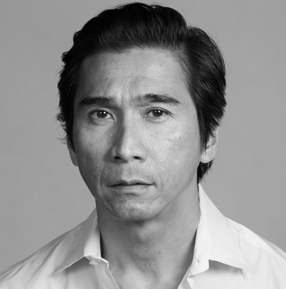Three days into his wake my father has not risen. He remains encased in pine, hollowed- out, his body unsealed, organs harvested, then zippered shut like a purse. How strange to see one’s face inside a coffin. The son at my most peaceful. The father at his most peaceful. Not even the loud chorus of wailing family members can rid us of our sleep. My mother sits front center. Regal in black, her eyes sharpened as Cleopatra’s. Her children, grown and groaning, quietly moan beside a white copse of trumpeting flowers. The church is forested with immigrants, spent after their long journey to another country to die. Before the casket is to be closed, we all rise to bid our final farewells. My mother lowers herself, kisses the trinity of the forehead and cheeks, then motions her obedient children to follow. One by one my siblings hover, perch, and peck. I stand over my father as I had done on occasions of safe approach: in his sleep, or splayed like a crushed toad on the floor, drunk. I study him, planetary, distant presence both bodily and otherworldly, a deceptive kind of knowledge. His beauty has waned but not faded, face surface of a moon, not ours, I turn pale, shivering, I place my hand on his, amphibious. While my mother places her hand warm on the cradle of my back, where I bend to fit into my body. Her burning eyes speak, Do it for me, they urge, Kiss your father goodbye. I refuse.
Credit
Copyright © 2018 by Joseph O. Legaspi. Originally published in Poem-a-Day on August 17, 2018, by the Academy of American Poets.
About this Poem
“How does one mourn? How does one mourn a difficult, unapproachable, loveless father? Death is a vaster canyon. Does one simply follow the observances of the rituals: the wake, the funereal flowers, the staging of the open casket? Is the son hateful, vengeful, or simply timorous or defiant or, finally, untethered?”
—Joseph O. Legaspi
Date Published
08/17/2018

